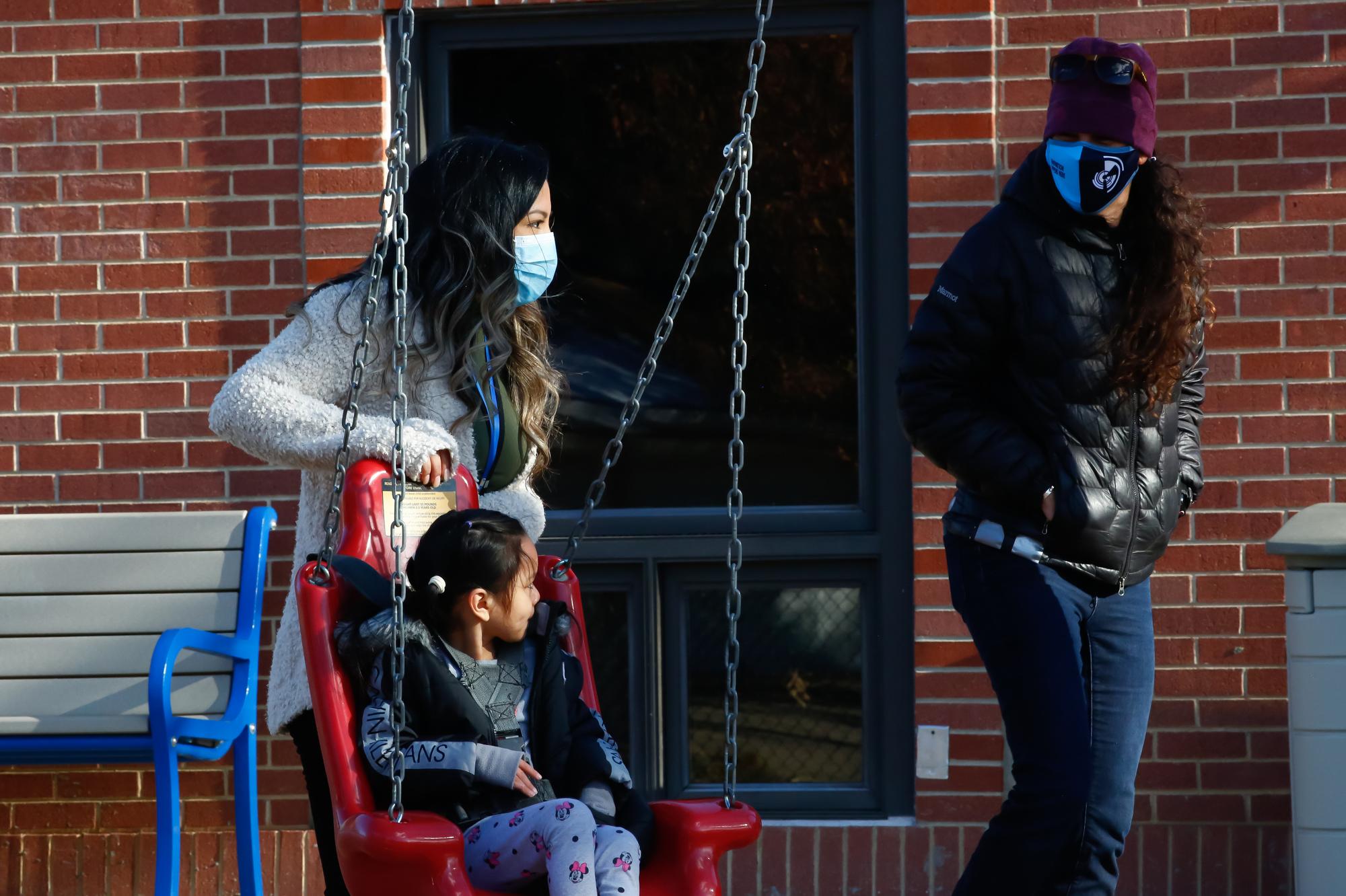
Students in Wendy Howenstein’s 7:45 a.m. Wednesday Zoom class weren’t following her lesson plan. Instead, the high school students in the St. Vrain Valley School District presented their own lesson plans for classes they might be in charge of one day.
Plans ranged from “All About Me” posters, lessons on how to have an attitude of gratitude, positive self-talk and even plans on reading and identifying stories to help teach empathy.
“I just want them to know that they’re included in everything no matter what they dress like, act, or how they are,” said student Margarita Gonzalez, after presenting her project.
Grace Wardle, 18, shared a colorful “wheel” she designed for young children to share their feelings.
“When they’re feeling something, I’ll be like ‘Get out your wheel, show me what you’re feeling and then what you need for that,’” she said.
Welcome to “Introduction to Early Childhood Education” — it’s not your typical college-level high school class.
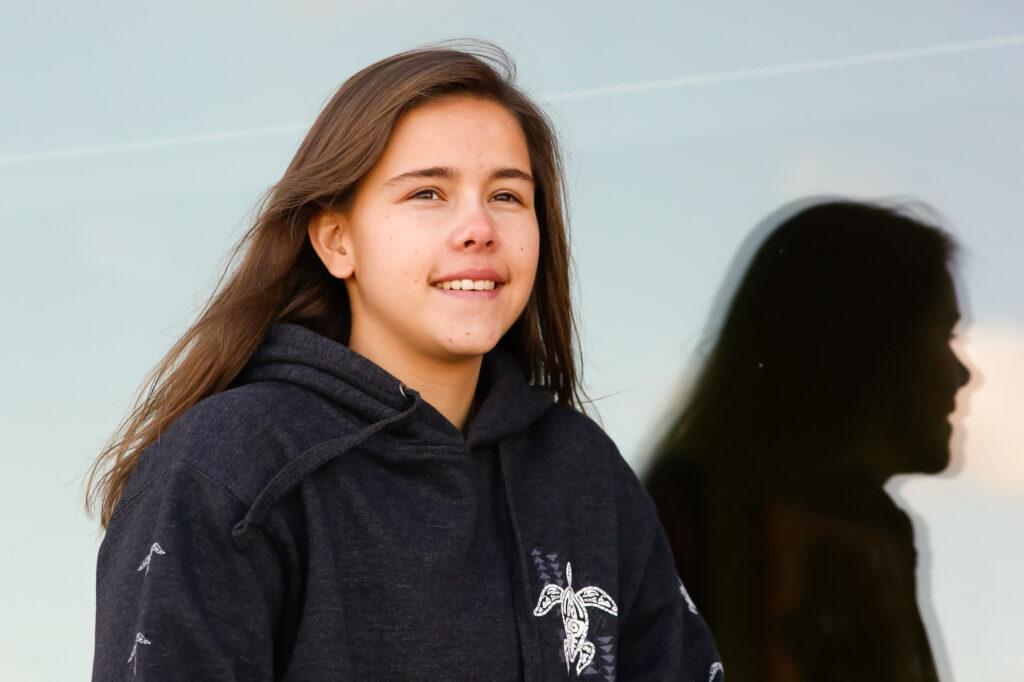
Howenstein, an adjunct professor at the University of Colorado Denver, gave feedback on the projects and encouraged the students to provide feedback to presenters, telling them school teachers don’t work in a vacuum.
The class has a larger purpose beyond teaching high school kids the developmental phases of 3-year-olds. It's helping students like Gonzalez and Wardle into a possible career in early education and could be a significant way to help combat Colorado’s growing and critical teacher shortage both in grade school and early childhood.
The state only has enough licensed educators to care for roughly 40 percent of children in Colorado under the age of six. There just aren’t enough qualified teachers. More than one in four early childhood professionals changed jobs in 2019 and half of them changed jobs at some point in the last three years.
That’s one of the goals of Colorado’s ambitious Early Childhood Workforce plan: to expand and improve high school programming that leads to the students eventually working in licensed early childhood settings.
Tapping high school students could be one way to fill the pipeline
The St. Vrain Valley school district in Longmont developed the Pathways to Teaching program in the spring of 2018. School officials and early childhood educators knew there were huge shortages of both early education and K-12 educators. There was also a tremendous gap in how many teachers of color the district employed.
“They [district leaders] thought this would be a cool way to open up opportunities for those first-generation, second language learners, underrepresented high school students, to look at teaching as a viable career,” said Howenstein, who directs the P-TEACH program. “And at the same time create that pathway to fill a lot of early childhood openings in our district.”
The program also gives high school students exposure to college-level classes, a chance to earn college credits and it pairs them with mentor teachers. It gives them a head start on their post-secondary education. Last spring, 29 seniors from six St. Vrain high schools graduated from the P-TEACH program — all of them earned college credits before going to college. Since 2018, 46 have graduated from P-TEACH.
It’s not the only such program in the state.
In 2019, 27 high school students in La Plata County completed early childhood education coursework in partnership with Pueblo Community College, and an estimated 30 students completed courses in 2020. Across the state, there are 48 high school early childhood education pathway programs that are pursuing or have received federal and state funding to help run the programs.
Michelle Dennis of the Colorado Community College System, which oversees the early childhood education pathway programs, hopes to increase high school programs in rural southern parts of the state and mountain communities.
Wardle, a senior at Niwot High School, entered the P-TEACH program in her junior year. She likes the small sizes and their hands-on nature. There are 11 P-TEACH classes, such as STEM Teaching, child guidance, child development and a field experience and seminar.
“We’re doing projects together and constantly working together as if you would in a school,” she said.
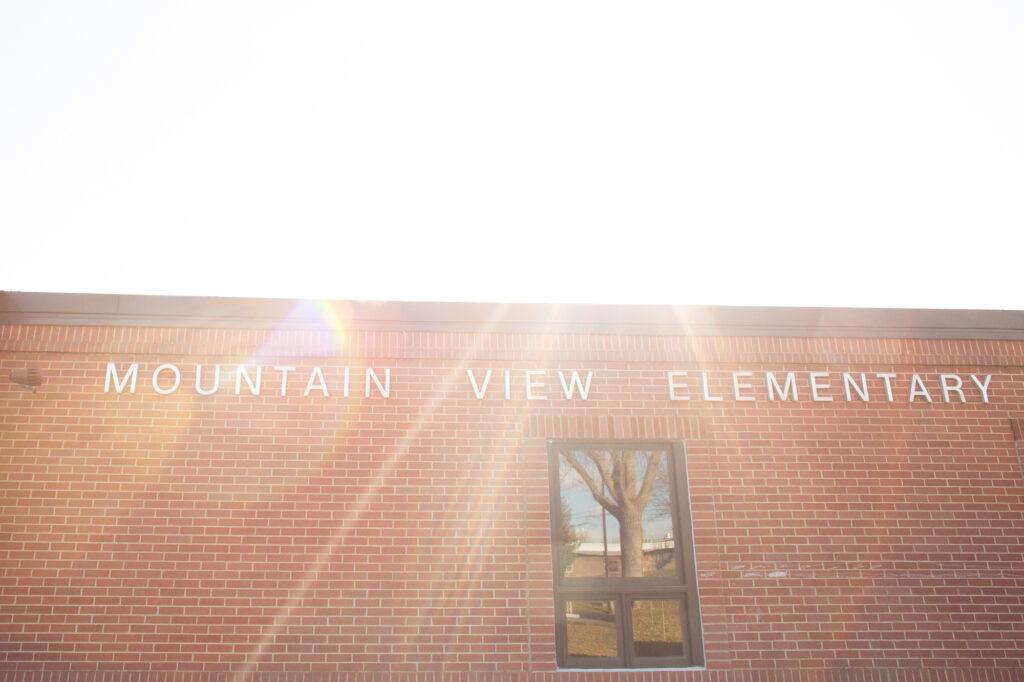
Each class also gives students real-life experiences in a district classroom. In “Intro to Special Education” for example, students spend time supporting teachers in special education classrooms. They even create lessons for the classes. Hands-on experience is gained through internships and through paid jobs as tutors and staff members in the district’s before- and after-school programs.
Howenstein said the program attracts a diverse range of students: those who’ve known their entire lives they want to be a teacher, students who Howenstein encourages to try just one course, or students who see it as a pathway out of poverty.
College-level classes and feedback from classmates and teachers “gives them that confidence that they really need when they're embarking on something that looks like a long, four-year academic program,” Howenstein said. “They have that confidence to feel like they can do it.”
Ninety percent of P-TEACH graduates plan to go on to a two- or four-year college, many in early childhood or elementary education.
Instructors are upfront about the challenges of pay and long hours. They also spend a lot of time talking with students about what’s important to them in life: Is teaching something they can get up each morning and be excited about?
“It will either capture you or not,” Howenstein said she tells the students. “That's the whole goal of getting you in a classroom. Either you'll be in there and think it's the best thing you've ever done, or you'll get in a classroom and be like, ‘I could never do this.’”
Most students start P-TEACH as a junior or senior but the interest level is so high, said Howenstein, that some start in their freshman or sophmore year
“They fall in love with being with kids and planning lessons and sharing their lessons with each other.”
What happens to P-TEACH students after high school?
It was a crisp fall day. Ashely Rojas Carbajal tied up jackets, pushed three- and four-year-olds in swings, and ran through the playground at Mountain View Elementary.
Rojas Carbajal of Fort Lupton graduated from Frederick High School in 2020 A counselor told her about the P-TEACH program in her senior year. She couldn’t decide between a career in nursing or teaching. She checked out nursing and decided it wasn’t for her. But she loved being around her little sister and cousins.
“I really like preschool. They’re very active, it’s never boring,” she said. “It’s always a fun job.”
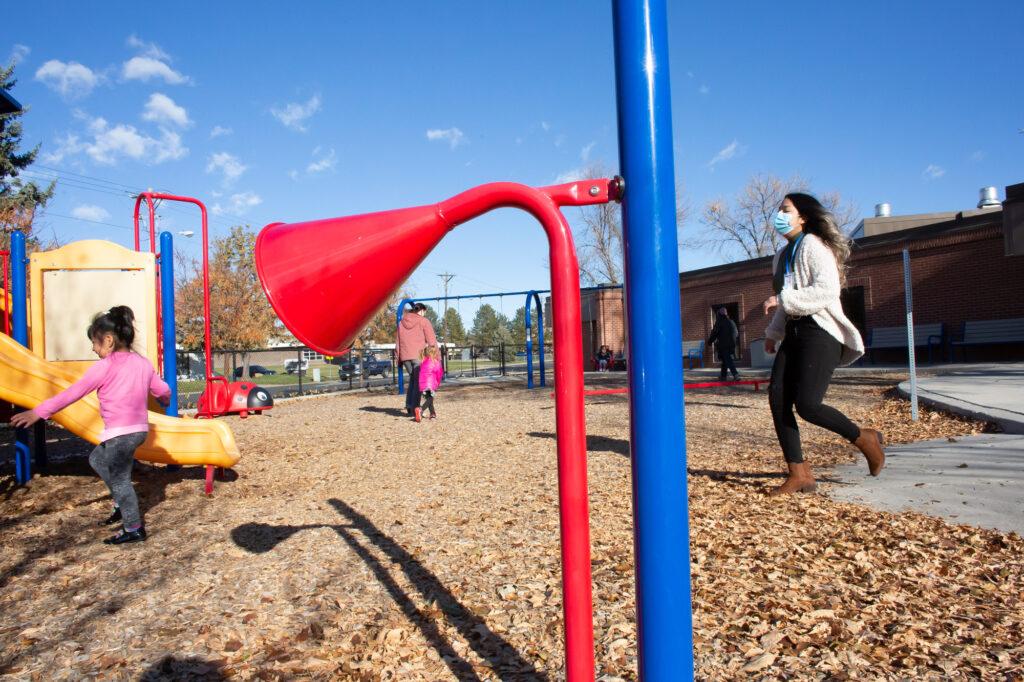
Like some in her P-TEACH graduating class of 29, Rojas Carbajal works mornings as a part-time paid apprentice with a mentor teacher in a district preschool. In the afternoons, she’s a student at CU Denver. The program has agreements with that school and Front Range Community College that allows P-TEACH courses to count toward earning an education degree. The program is working on making agreements with other Colorado colleges.
Rojas Carbajal said her college classes helped prepare her for an apprenticeship. For example, her class on inclusive education helps her observe her mentor teachers more closely on how exactly she phrases questions and “How she makes every kid feel connected and welcomed,” she said.
On Fridays, Rojas Carbajal and her mentor teacher talk about the goals for the next week’s classroom and for each other.
“I’ve been able to see with my mentor teacher a little bit of why she does the things she does in class and what’s her thought behind it to reach her goal,” she said.
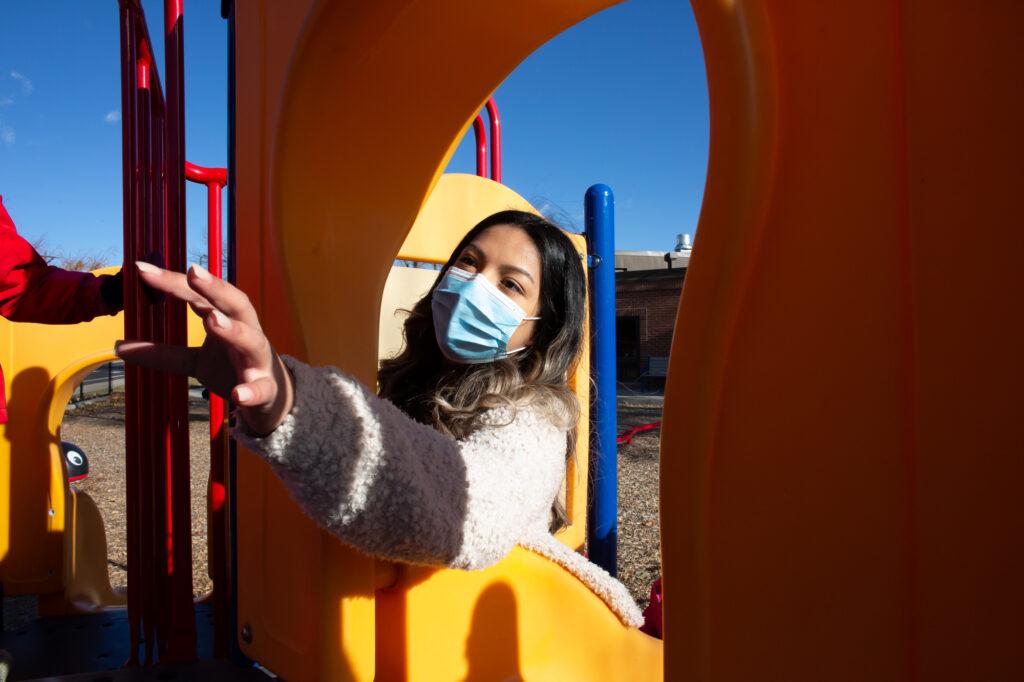
P-TEACH’s Howenstein said having apprentices or interns benefits the mentor teachers as well.
“When these kids are in classrooms, those mentor teachers step up their game and engage. And for them, it's so gratifying, right? The mentor teachers are then excited again, and it gets them fired up about teaching.”
Each apprentice also has a coach from the district, who shares ideas for class activities, provides additional support if needed, helps make connections from course work to the classroom and “negotiating the theory into practice,” explained Nicole Rudman, a coach for P-TEACH apprentices.
“Children’s work is play, right? It can look like it just naturally happens,” she said. “But those really meaningful learning experiences don’t just happen. There’s a lot of planning and conversation and thought goes behind that. Talking through that, what goes into making a really engaged learning environment.”
Rojas Carbajal, who is bilingual, is the first in her family to attend college.
“I do feel really lucky,” she said. “I was really stressed before. I did not know where I was going to go or how I was going to pay for anything. It came out of nowhere and I really liked it.”
The P-TEACH program pays for part of her education. And Rojas Carbajal said she knows what she’d like to do when she’s done with school: She’d like to one day return to be an early childhood teacher in the St. Vrain district.
This story is part of a series produced as part of the Higher Education Media Fellowship at the Institute for Citizens & Scholars. The Fellowship supports new reporting into issues related to postsecondary career and technical education.
Photos by Kevin Mohatt for CPR News.








